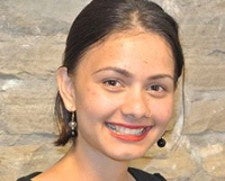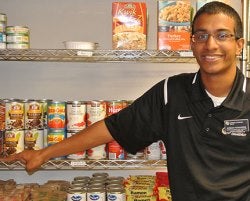
CU Denver student Sabitra Niroula
She was born in a refugee camp in Nepal where she lived for the first 12 years of her life. She didn't start her education in the United States until middle school. Her family is, in her own words, "economically unstable."
Despite that, Sabitra Niroula is a CU Denver standout—studying for a dual degree in pre-nursing and psychology, working in the Financial Aid Office, serving as vice president of the South Asian Student Association and preparing to travel to Washington, D.C., as an E3! Ambassador, a program of the White House Initiative on Asian Americans and Pacific Islanders.
But she couldn't be such a high-achiever if she were hungry—and without the CU Denver Food Pantry, she says she would be just that—hungry.
"It's a life-saver," Niroula said, as she made a weekly trip to the pantry to pick out her favorites—pasta, spaghetti sauce and ramen noodles. She uses the Food Pantry because life has made her a pragmatist. "I lived in a refugee camp," she said. "You have to accept reality."
These days the Food Pantry is facing its own reality—with bare shelves in urgent need of donations from the CU Denver community.
'We don't judge'

Food pantry coordinator Jordan Fernandes
Food Pantry Coordinator Jordan Fernandes, a student in the CU Denver Business School, can rattle off statistics about the Food Pantry that might astonish some listeners:
- It serves more than 160 unique students annually.
- On average, seven students use the Food Pantry daily.
- Last year, the Food Pantry prepared 55 baskets for students who would not otherwise have had a Thanksgiving dinner.
Fernandes has seen all types of clients visiting the Food Pantry—from freshmen to students who are senior citizens—but he cannot forget one young woman who was pregnant and homeless and delighted to be able to eat.
"We take everyone with open arms, and we don't judge anyone," Fernandes said. "Many of the students have jobs, but with housing, books and student fees, they just can't make ends meet."
The Food Pantry works on a point system. Once a week, students can use eight points toward food and three points toward hygiene products, such as toothbrushes. With eight points, a student typically will take home a can of vegetables, some tuna and spaghetti with sauce—enough to get by for a day or two.
The pantry, which gets no support from student fees, is resupplied by an annual "Feed the Need" campus-wide food drive in February. Last year, teams from different university departments competed for a food-gathering trophy, and the final tally was 1,000 pounds of food, enough to keep the pantry going for about two months.
The Food Pantry staff is focused on raising awareness that food insecurity is a real concern for CU Denver students. "It is our hope that faculty and staff will become familiar with the services we offer," said Megan Frewaldt, assistant director for community engagement. "When they meet with students who share their situations, they can refer them to us for support and resources."
Frewaldt oversees the CU Denver Food Pantry. She also chairs a committee that hosts "Auraria Hunger and Homelessness Awareness Week" in November to raise awareness about food insecurity and homelessness among students.
CU Denver students who donate their time to Food Bank of the Rockies are thanked with food donations that come back to the CU Denver Food Pantry. But with the continuously increasing cost of rent and housing in the metro area, the Food Pantry is serving more students all the time, leaving its shelves bare.
How can you help?
Ask Fernandes what people could give, and he emphasizes the need for nutritious foods. High on his list would be spaghetti sauce, pasta, peanut butter and jelly, brown rice, quinoa, canned vegetables and non-perishable boxed meals.
Donors can drop off food at the pantry which is located in Room 127 of the Tivoli—just walk to the I-pie on the Tivoli second floor and then take the staircase down one flight, and you will find Room 127. It's open from 8:30 a.m. to 4:30 p.m. daily. You can donate to the food pantry here.
Last year, the Food Pantry received approval to provide perishables, including refrigerated items. Its current home isn't large enough to house a refrigerator or shelving for produce, but the staff is working with the CU Denver Development Office in hopes of securing a donation that would cover the costs of a renovation to increase the size and capacity of the Food Pantry.
After checking the nutrition information on a few items ("I'm pre-nursing and I've done research on malnutrition"), Niroula left for class, energized and considering different ways to share the generosity others have shown to her. She would like to support the Syrian refugees who are flooding Europe. "I want to help those people," she said. "I see myself in them."
Originally published as "This pantry needs your help" by Vicki Hildner of University Communications on September 28, 2015.
